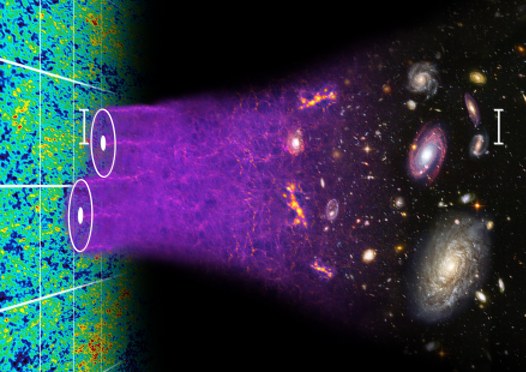The 2023 Giuseppe and Vanna Cocconi Prize in cosmology awarded to the SDSS/BOSS/eBOSS collaborations

The 2023 Giuseppe and Vanna Cocconi Prize is awarded for outstanding contributions to Particle Astrophysics and Cosmology in the last fifteen years, and in particular, it has been given to the SDSS/BOSS/eBOSS collaborations “for their outstanding contributions to observational cosmology, including the development of the baryon acoustic oscillation measurement into a prime cosmological tool, using it to robustly probe the history of the expansion rate of the Universe back to 1/5th of its age providing crucial information on dark energy, the Hubble constant, and neutrino masses”.
Baryon acoustic oscillation measurement
Spectroscopic surveys such as BOSS and eBOSS study the geometry and structure growth in the history of the universe in a model-independent way through the ‘standard ruler’ technique.
The length of this standard ruler can be directly linked to the so-called sound horizon, which is the distance that any perturbations were able to travel in form of sound waves in the early universe before recombination (which is the epoch were electrons and protons first became bound to form hydrogen atoms). This standard ruler is also well measured from Cosmic Microwave Background observations.
By measuring the standard ruler across cosmic time from deep galaxy redshift surveys, the expansion history of the universe can be reconstructed, and this now well-known and standard technique goes under the name of Baryon acoustic oscillations or BAO.
Participation of the IEEC
The Institute of Space Studies of Catalonia (IEEC — Institut d’Estudis Espacials de Catalunya) has had an active participation in these collaborations through its research unit ICCUB (Institute of Cosmos Sciences of the University of Barcelona). A number of its researchers, including Héctor Gil-Marín, Jordi Miralda and Ignasi Pérez-Ràfols, have participated in these collaborations. The ICREA-ICCUB researcher Licia Verde and former members Antonio Cuesta, Beth Reid and Roland de Putter have been also part of the team.
All of this year's prizes from this division of the European Physical Society can be found on the following website: https://eps-hepp.web.cern.ch/eps-hepp/prizes.php
Illustration courtesy of Chris Blake and Sam Moorfield, SDSS.
